THUNDER BAY — Proposals to cut an arena and two city bus routes in 2024 have been put on ice.
The Neebing Memorial Arena and the interlined 4–Neebing and 6–Mission transit routes were among the most controversial on a list of proposed cuts to city services.
On Monday, however, administration withdrew those recommended cuts, at least in the immediate term.
The closure of the arena will still be contemplated following the winter season.
The city is also pursuing possible plans to replace the two bus routes, which serve the Neebing area and Fort William First Nation, with on-demand service using smaller vehicles.
Memos advising council against carrying out the cuts this year were accepted with little discussion at Monday’s meeting.
The moves leave questions over how — or whether — the city will achieve council’s goal of finding $1.5 million in annual service cuts by 2024.
Together, cancelling the bus routes and closing the Neebing arena would have brought roughly $475,000 in yearly savings.
That means council will need to find alternate spending reductions totalling nearly half a million dollars.
Eliminating the two transit routes would have brought an estimated $293,800 in yearly savings.
The routes had been identified as the “lowest-performing” in the Thunder Bay Transit system, with average ridership of roughly five to six people per hour in operation.
The recommendation to cut the routes had prompted concern from Fort William First Nation leadership, with Chief Michele Solomon expressing disappointment it was made without warning or consultation.
City staff had suggested that was central to their reversal on the issue, promising to discuss the future of the service with First Nation leadership going forward.
The Neebing Memorial Arena’s closure was estimated to bring $180,400 in yearly savings.
In a memo released last week, administration advised council that closing the arena before the 2023/2024 winter season would not be feasible, since it would come well after the city launches its winter ice allocation process.
“The allocation of indoor ice for the upcoming fall/winter season requires knowledge of the inventory of ice available,” wrote general manager of community services Kelly Robertson. “Administration needs to initiate the ice allocation process no later than July 24 in order to issue contracts… in time for the regular start of the [season].”
“Therefore, administration will be proceeding with the ice allocation process… assuming that the Neebing Arena remains open.”
Robertson advised the closure could instead take place at the end of the upcoming winter season, producing partial savings in 2024.
The recommended closure prompted vocal opposition from local hockey groups, who have pointed to the arena’s significant role in supporting minor hockey.
Closing the Neebing arena would wipe out 14 per cent of the city’s total bookable ice, staff report.
A survey launched as part of that process and obtained by TBnewswatch asks ice users if they would be willing to pay up to 20 per cent more for ice time in order to keep the Neebing arena open.
